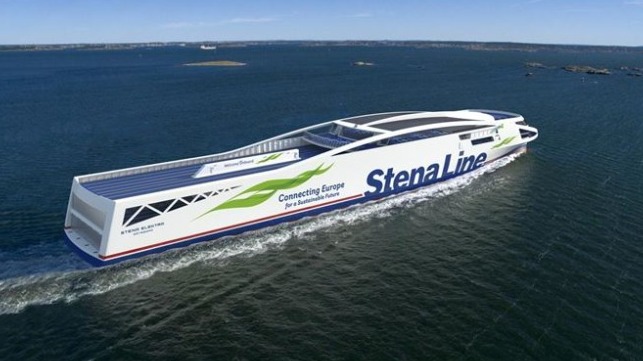Ferry operator Stena Line, working in conjunction with the Frederikshavn Municipality, and the Port of Frederikshavn, Denmark are committing to creating the world’s first fossil fuel free large ferry line operating between the Danish port and Sweden. Under the three-way agreement, the ferry operator will launch large, battery-powered ferries while the port and local government committed to making the necessary investments onshore.
“Our ambition is to lead the development towards a fossil fuel free shipping and sustainable transport at sea. That is why we are investing in new technologies and various alternative fuels. We are already ten years ahead of the international shipping industry’s target for reducing carbon dioxide emissions, but with Stena Elektra we are taking another big step on Stena Line’s sustainable journey, on the road to a completely fossil fuel free operation,” says Stena Line’s CEO Niclas Mårtensson, who is also a member of the Swedish Government’s Commission for Electrification.
The ferries, known as Stena Elektra, are designed to be the world’s first large fossil fuel free RoPax vessels. The design, which builds on Stena efforts that began in 2018, calls for a vessel that will be approximately 656 feet long, capable of carrying 1,000 to 1,500 passengers and has a capacity of 3,000 lane meters. Each ferry will be battery-powered with a capacity of around 60-70 MWh. The crossing time would be approximately three hours with a one hour turnaround in port which includes the time to recharge the vessel’s batteries. Sterna currently operates battery hybrid power on the Stena Jutlandica on the Gothenburg-Frederikshavn route.
“The Port of Frederikshavn shares the high and green ambitions that make this project possible,” says Mikkel Seedorff Sørensen, CEO of the Port of Frederikshavn. “The city has also shown that it has a unique capacity for change in its DNA, which is evident not least in its sustainability work. When we are now taking steps towards making the Gothenburg-Frederikshavn line completely independent of fossil fuels is not only positive for us but for the entire Kattegat region.”
The port along with the Frederikshavn Municipality also committed to participating in the creation of a sustainable connection between Sweden and Denmark with the two Stena Elektra vessels. Onshore infrastructure, such as sustainable charging facilities, must be developed in parallel, notes Stena. In the agreement, the Port of Frederikshavn commits to securing the necessary infrastructure in the port and its surroundings on the Danish side.
Stena Line previously announced the Tranzero Initiative, together with the Volvo Group, Scania, and the Port of Gothenburg. The aim is to reduce carbon dioxide emissions linked to the Port of Gothenburg by 70 percent by 2030. Coupled with the agreement with the municipality and port of Frederikshavn, Stena said this completes the chain laying the groundwork for the world’s first fossil free route for large ferries.
Source: The Maritime Executive






